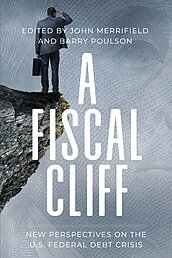The unsustainable, and still rapidly growing, U.S. federal government debt is a classic case of ‘‘in denial.” Despite numerous congressional committees, bipartisan commissions, and votes, we are no closer to a solution to the debt crisis than we were more than a decade ago. In fact, in 2018, a congressional committee was appointed to recommend budget process reforms, but that committee could not agree on any recommendations to submit to Congress.
In this timely volume, scholars and policymakers assess the United States’ fiscal constraints and provide new perspectives that are desperately needed in order to solve the nation’s debt crisis. Previous recommendations focused on the outcomes of fiscal policy but perhaps we should take a step back and ask whether the fiscal and budget process rules themselves should be reformed. The essays in A Fiscal Cliff suggest that “unless we reform our fiscal rules and institutions, we are not likely to solve the debt crisis and restore sustainable fiscal policies.” Topics discussed include
-
Historical perspectives on the origins and the pre-pandemic state of the crisis
-
In-depth, international perspectives on the U.S. debt crisis
-
Fiscal policy reforms designed to significantly reduce deficits and debt
-
Reforms to the budget process, including transparency, accountability, and constraints
-
The U.S. debt examined through the lens of public choice theory
While the dominant sentiment is that maybe if we ignore it, it will just go away, the debt crisis will not just vanish. A Fiscal Cliff is a timely addition to a critical policy discussion.
